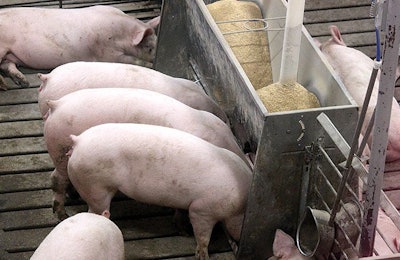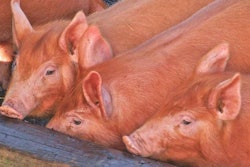
Classical swine fever (CSF) continues to affect the domestic pig and wild boar populations in two regions of Japan since the first outbreak in 26 years was confirmed in September 2018.
The number of farms in Japan with confirmed cases of CSF now stands at 26, according to the latest report from the agriculture ministry to the World Organisation for Animal Health (OIE). Including farms with epidemiological links to those infected premises and therefore at high risk of infection, the total for affected locations is 42 with more than 106,000 pigs.
The disease has been confirmed at four farms since our last report at the end of April. Two locations were directly but independently infected by the virus in the city of Tahara in the prefecture of Aichi, and two more in Yamagata in Gifu. Almost all the outbreaks in Japan’s domestic pigs have been in those two prefectures.
No pigs are reported to have died as the result of the disease in these latest outbreaks, as the cases were identified as the result of surveillance testing or as soon as the animals showed signs of illness, such as fever or reduced appetite. At the four farms, 14,351 pigs were culled in order to reduce the risk of infection.
Over the past two months, a further 3,996 pigs have been destroyed at a further five farms — four in Tahara and one in Seto city in Gifu — with an epidemiological link to these or previous outbreaks.
In mid-May, the ministry also reported to the OIE the destruction of 187 carcasses of pigs at two slaughterhouses — one in Gifu and one in Nagano prefecture — because the animals came from premises epidemiologically linked to farms where CSF outbreaks had occurred.
Thus official losses of domestic pigs from CSF in Japan reported over the past two months amount to 18,534 animals.
Since Japan’s first outbreak of CSF in 26 years in September 2018, 42 pig farms have been directly or indirectly impacted by outbreaks, and the total number of animals lost through mortality or destruction exceeds 106,700, based on the official OIE reports.
Authorities urge early shipment of pigs
In order to reduce the risk of CSF outbreaks, the Japanese government has been urging farmers whose animals are at high risk of infection to ship their pigs ahead of schedule, reported Japan Times one month ago. This measure — for producers within 10 kilometers (6 miles) of infected wild boar — was aimed to allow more time for thorough cleaning and disinfection of premises, as well as renovations and improvements to reduce the risk of the virus being transmitted from the wild animals to domestic pigs.
Central and prefectural governments undertook efforts to make up any difference between the price received by the farmer and the national average as a result of the early shipment.
CSF outbreaks in wild boar in two prefectures
Over the past two months, Japan’s agriculture ministry has reported 282 outbreaks of CSF in wild boar, and these led to the loss of 307 of the animals as the result of mortality or destruction.
Nine of these cases were in Aichi, and the rest were in Gifu, and these are the only two prefectures where wild boar have tested positive for the CSF virus.
Since the first testing of wild boar in September 2018 and June, 627 of the 1,429 animals tested in Gifu were positive for the CSF virus, as were 28 out of 465 tested in Aichi. All 434 wild boar from Japan’s other prefectures have tested negative for the virus.

















